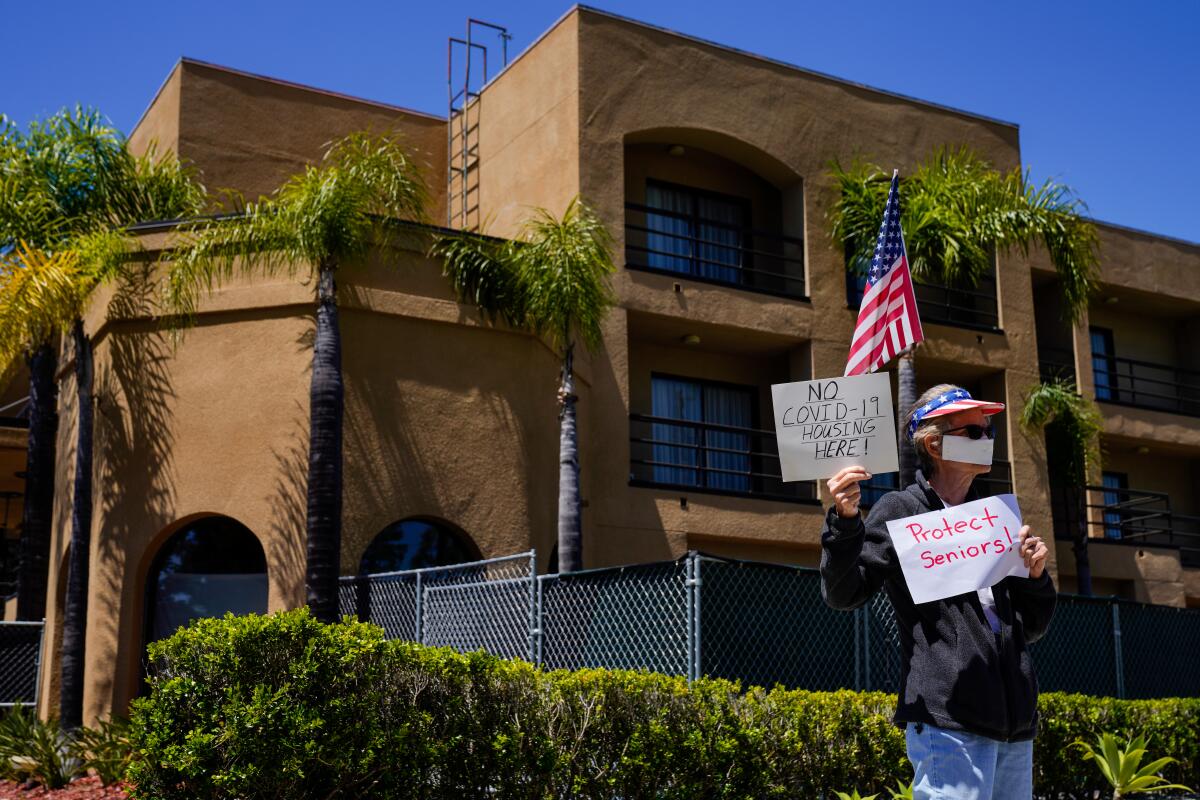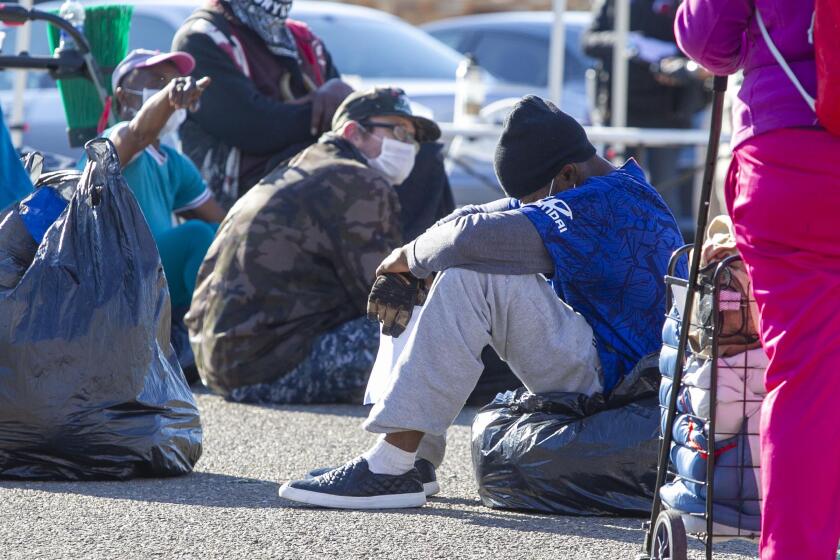O.C. can use Laguna Hills hotel as homeless shelter amid coronavirus outbreak, judge rules

Officials in Orange County can move forward with a plan to convert a 76-room hotel in Laguna Hills into temporary housing for homeless people in an effort to prevent a surge of deadly coronavirus cases from spreading in the community, a judge ruled Monday.
The county brokered an agreement this month with Elite Hospitality Inc. to lease the Laguna Hills Inn for at least 90 days to shelter homeless individuals who are over 65, have underlying health conditions, are showing symptoms of COVID-19 or who have tested positive for the coronavirus.
The county had hoped to begin moving people into the hotel last week. However, their plans were delayed when Laguna Hills — a city of roughly 31,000 people in the southern section of the county — filed a lawsuit against the hotel’s owner, the county and a nonprofit specializing in homeless outreach in an attempt to block the effort.
City officials, and the owners of four buildings adjacent to the hotel, alleged the project would put the surrounding community at risk and would violate restrictions outlined in the property’s covenants, conditions and restrictions, or CC&Rs.
During a hearing last week in the case, Orange County Superior Court Judge Thomas Delaney said he wasn’t swayed by the city’s argument that the county’s efforts would turn the building into a public nuisance. However, he said he needed more information from attorneys about whether the state’s emergency order would permit the county to forgo restrictions outlined in the property’s CC&Rs.
After roughly 30 minutes of arguments during a hearing held by phone Monday, Delaney ruled that under state law, the county — acting on behalf of the state — can use the property to address the public health crisis.
“The county is acting consistent with the governor’s orders in the context of this state of emergency,” Delaney wrote in his ruling. “The CC&Rs must temporarily yield to the government’s limited use of its police powers during this state of emergency.”
Some cities are blocking California efforts to protect homeless people from coronavirus, Newsom says
California’s effort to move homeless people into hotels to blunt the coronavirus spread has helped, but advocates say it’s hampered by local opposition.
Under its contract with the hotel, the county will pay $8,436 per day for use of the property. Those funds are expected to be reimbursed by the state under Gov. Gavin Newsom’s Project Roomkey program, which provided $50 million to purchase or lease hotel and motel rooms across the state to shelter homeless people, along with an additional $100 million in emergency grants to provide support services.
The hotel — like several others being used for temporary shelter throughout the county — will be managed by the homeless nonprofit Illumination Foundation, which will provide medical oversight, security, on-site meals and support services, according to Jessica Good, a spokeswoman for the county Health Care Agency.
City leaders have maintained that Laguna Hills — with a population including about 14% who are senior citizens and which borders the predominantly senior community of Laguna Woods — is not an appropriate place for such a facility.
Kelly Richardson, an attorney representing Laguna Hills, said the city and the owners of properties adjacent to the hotel are disappointed, but are assessing their options after Monday’s ruling.
“I don’t feel the residents’ safety is being protected, and I don’t think the property rights of the building owners adjacent to the COVID-19 shelter have been sufficiently protected,” Richardson said. “I think we have to be very cautious in times of emergency before we take away personal liberties and property rights.”
As of Monday, Laguna Hills had 15 of the county’s 1,676 confirmed coronavirus cases. During last year’s point-in-time count, the city had 24 unsheltered people living on its streets.
The county had placed 37 homeless people in hotel or motel rooms as of last week, including 18 who are sick or have COVID-19 symptoms. Officials have identified eight individuals they plan to shelter at the Laguna Hills hotel.
County CEO Frank Kim said in a declaration filed in court that identifying hotels willing to house homeless people from a list of limited options that was provided by state officials has been a challenge for employees, especially in the southern section of the county.
Residents in Laguna Woods protested when it came to light earlier this month that the county had entered into an agreement with Ayres Hotel to use a property nearby for homeless housing and medical care. That deal quickly withered in the face of strident community opposition.
Kim warned that if the city was successful in obtaining a temporary restraining order blocking the project, the county would “get similar challenges from every other host city seeking to stop COVID-19 homeless from being placed in each city.”
“This will clearly impact the public’s health and the county’s ability to comply with the state’s order,” he said.
Gov. Gavin Newsom announced $150 million in emergency funding for homeless people at risk of contracting the coronavirus that causes COVID-19.
Homeless people, who are more likely to have underlying health conditions and weakened immune systems, often from living on the streets, are at a higher risk for developing severe forms of COVID-19 than the general population, health experts say. With that in mind, officials across the state have been working on ways to quickly move people indoors amid fears that an outbreak in this vulnerable population could strain an already fragile health system.
Newsom acknowledged during a news conference Saturday that the effort is facing some obstacles at the local level.
“Cities are blocking these efforts at a time of crisis,” Newsom said. “Cities that are blocking those efforts — please consider the morality of those decisions.”
Times staff writer Patrick McGreevy contributed to this report.
More to Read
Start your day right
Sign up for Essential California for news, features and recommendations from the L.A. Times and beyond in your inbox six days a week.
You may occasionally receive promotional content from the Los Angeles Times.









